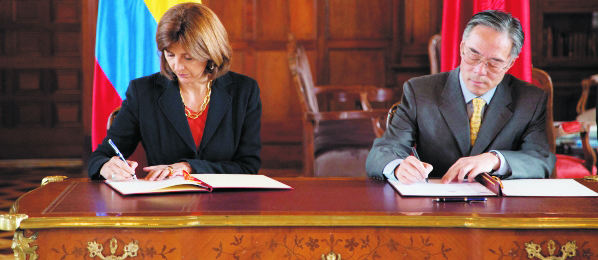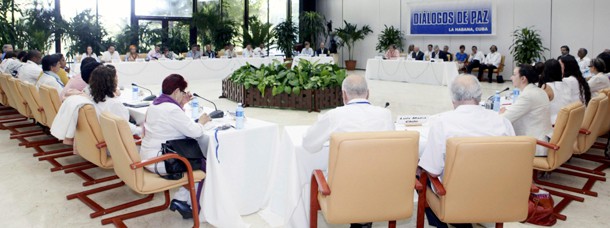
2015: The Colombian Minister of Foreign Relations and China’s Ambassador in Colombia sign an agreement on economic and technical cooperation. Photo: Andrés Piscov – OP Cancillería
As Chinese influence grows in the region, bringing with it both relief and suspicion in large quantities, we look at the current situation and political context.
“The Colombian government,” says Jaime Suarez, executive director for the Colombian Chinese Investment and Commerce Chamber, “is adopting a much more focussed strategy towards the Chinese market, both in relation to investments and the exportation of our products.”
It would appear that this approach is a reciprocal one, not just with Colombia but Latin America in general. In a January meeting between China and CELAC (Community of Latin American and Caribbean States), China signalled its intentions to expand its One Belt and One Road Initiative, Xi Jinping’s grand vision to increase commercial and cultural ties between Eurasian countries and the region. However, this invitation is but a rebranding of what has been occurring since 2000. During that time, China’s trade with Latin America has increased twenty-fold, and will continue to do so with Jinping’s promise to invest USD$250 billion in the region over the next ten years.
China is Colombia’s second largest trading partner, but whilst the Chinese Foreign Minister, Wang Yi, expressed in a book regarding Sino-Colombian diplomatic relations his desire for an “eternal friendship that will continue down generations,” Colombia has received relatively little investment in comparison to other countries in the region such as Peru, Ecuador and Venezuela. This, admits Suarez, is because these countries have “a much stronger political relationship with China than Colombia.”
Consequently, China holds something of a mysterious image in Colombia, perceived simultaneously as an auspicious trade partner and a malevolent new player, muscling its way in on a territory in which US influence has traditionally been strong. The Free Trade Agreement of 2011 between the States and Colombia was a tangible reaffirmation of this fact, but the pendulum may soon swing the way of the Chinese as the current US administration adopts a more protectionist approach, in contrast to the continued Chinese policy of expansion.
The question is whether this is something that Colombia should welcome with open arms like its continental counterparts, or whether it should be wary of the potential consequences that increased Chinese investment may bring.
It would be safe to assume that President Santos firmly sits in the former camp. During the course of his presidency he has repeatedly declared his desire to increase Sino-Colombian cooperation. Investment in infrastructure and energy is seen as the natural way forward for Colombia’s economic development, and the prospect of peace has enticed many Chinese investors to become increasingly involved in large-scale projects in both sectors. Several memorandums of understanding to increase cooperation in these sectors have been signed since 2012 by the respective governments and their institutions. Although not set in stone, this does suggest that China will play a significant role in the development of these two crucial components of the Colombian economy. Indeed, the Minister of Foreign Affairs, María Ángela Holguín, spoke of her excitement at the “recent creation of a platform to promote Chinese investment in Colombia.”
Social and economic impact
There is, however, a legitimate concern about the social and environmental impact that Chinese businesses and their investments will have on Colombia. A case study in 2015 by Boston University looked at the effects of oil fields belonging to the New Granada Energy Company (NGEC), a creation of the Chinese state-owned company Sinopec, in the region of Orinoquía. The study found that the extraction of oil poses a serious threat to the precarious wetland ecosystem they are located in. Some of the many dangers highlighted in the report are that the construction of roads in the floodplains without necessary structural planning may block the regular flow of essential water and that there is a risk of water pollution due to the high concentration of chlorides dumped into the water.
This is not an isolated issue, and it is exacerbated by the structural weakness of the environmental institutions in Colombia. Extraction of hydrocarbons in Colombia has to be approved by the National Authority of Environmental Licenses (ANLA). Yet in many cases, according to analysts, licenses for extraction are given out hastily without proper consultation or environmental mitigation measures. Concerns about the ANLA’s effectiveness will increase as China looks to invest further in areas with large amounts of natural resources and in need of infrastructural investment, particularly as most of these areas are rural and often vulnerable, beset by social difficulties and in which there is a distinct lack of governmental presence.
The relatively recent emergence of this new superpower in Colombia, and in Latin America, has inevitably aroused suspicions and criticisms. This is nothing new. In every region where Chinese investment can be found, a significant degree of dissent can also be found with it, some of it legitimate, some much less so. Predictably, a sizeable portion of resistance has come from the other superpower heavily invested in the region, the US. “Latin America,” said US Secretary of State Rex Tillerson, “does not need new imperial powers that seek only to benefit their own people. China’s state-led model of development is reminiscent of the past.”
One may respond to this statement by questioning the success of the “Washington Consensus” and the impact it had over its thirty or so years in Latin America. This period, which saw loans given to the region in return for the adoption of economic policies such as privatisation and liberalisation, saw Latin America’s per capita growth increase by less than 1% per year.
China’s loans, on the other hand, come relatively ‘condition-free,’ not because of a desire to appear as a magnanimous team-player, but because it wants its investments to boost growth, thus increasing the amount of exports from these loanee-nations to China, providing it with the resources that its population both needs and desires. These loans, however, also allow the possibility of greater access and exploitation for Chinese businesses and investors.
Diplomatic and cultural ties
It is not just through business that China is extending its reach in Colombia. The presence of three Confucius Institutes – which have the objective of promoting Chinese language and culture – suggests that China is attempting to establish a genuine, long-lasting connection. Martha Ferro Mendieta, who works for the Confucius Institute in Bogotá, explained that, “relationships between countries depend on the relationships between people.” With this in mind, the Confucius Institutes appear to be a legitimate attempt by China to foster diplomatic and cultural ties. Yet their presence does not come without controversy.
Internationally, there have been some accusations directed towards the institute, of which there are over 480 worldwide, that it is part of a soft power offensive. Such assertions are reminiscent of the Cold War and the US-Soviet geopolitical struggles of achieving and maintaining respective spheres of influence. They be may borne out of truth, or resentment at a country whose dramatically swift economic growth is almost incomprehensible, and whose customs and practices remain somewhat enigmatic to the western world.
Despite the seemingly inexorable rise of Chinese presence in Colombia, it’s by no means a done deal. This, as Jaime Suarez states, is largely a consequence of the upcoming presidential elections: “There is some political uncertainty […] Everything depends on the new president’s political orientation towards China.” Certainly, whoever finds themselves in the Casa de Nariño come August will have to deal with the contentious issue of a country that represents the most efficient and effective way of developing the Colombian economy, but one that will also bring with it certain risks.





